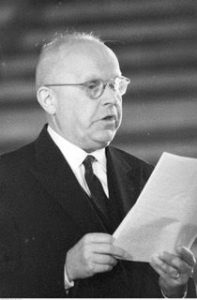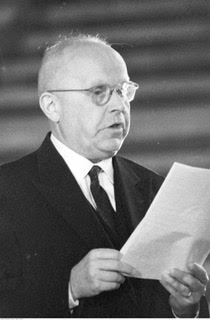
Stanisław Lorentz (1899-1991) was a Polish scholar of museology and history of art, who played an important role in shaping the international policies of protecting cultural heritage after the Second World War. He was Director of the National Museum in Warsaw between 1935-1985, honorary director of the same museum (1990-1999), and deputy chairman of the Polish Parliament between 1965 and 1969. Professor Lorentz chaired the Polish Committee of the International Council of Museums (ICOM) and the Polish National Committee of the International Council on Monuments and Sites (ICOMOS) (1965-1981). ICOMOS was a professional association affiliated to UNESCO that was founded in 1965 to promote the conservation and protection of cultural heritage sites around the world. Lorentz’s main contributions to the field of heritage protection include his staunch opposition to the excuse of military necessity for the destruction of cultural heritage. He also distinguished himself by way of activism for the prohibition of nuclear weapons. He was prominently involved in the reconstruction of cultural heritage in post-war Poland and abroad..
Stanisław Lorentz was born in 1899 in Radom, Poland and graduated from the University of Warsaw, where he studied Philosophy and History of Art. In 1924 he defended his dissertation on Ephraim Szreger, a Warsaw architect from the age of Enlightenment. Lorenz spent one year of professional training in Paris. Between 1929 to 1935 he worked as the art conservation officer in the region of Vilno (now Lithuania) and Novogrodek (now in Belarus), and taught at the university of Stefan Batory in Vilno (then Poland). In 1935, he was appointed director of the National Museum in Warsaw.
Lorentz spent the Second World War in occupied Poland and was one of the leading actors involved in the wartime salvage of Polish cultural heritage. Because of the effort of the team of museum professionals and activists led by Stanislaw Lorentz, multiple collections of libraries, museums and archives were preserved. While serving as the "Polish head of the museum under the German commissioner", he was also a high-ranking member of the Polish Underground State, safeguarding Polish cultural property from destruction and looting. Throughout the war, he kept a thorough inventory of the destruction caused by the Germans and of the looted collections. His activity facilitated the subsequent restitution and reconstruction of these collections. He was also responsible for compiling regular reports destined for the Polish government in exile in London about the state of Polish culture under Nazi occupation.
After the war, Lorentz was instrumental in the establishment of several national institutions which played a key role in the protection and conservation of cultural heritage. In 1948, he initiated the (Polish) General Directorate for Museums and Monument Protection and was appointed its first director. Lorentz also represented Poland in various international organisations which advocated the protection of cultural property. While not a professional lawyer, he became an active contributor to the debates on the legal means for protecting cultural properties during military conflicts. In 1954, he led the Polish delegation at the Hague conference of UNESCO, where the draft of the 1954 Convention for the Protection of Cultural Property in the Event of Armed Conflict was discussed. The position advocated by Professor Lorentz, alongside other representatives of Eastern European states with similar experience of massive cultural destruction, was driven by the desire to provide the utmost protection for cultural goods in case of future military conflicts. His position on various contested issues, including the excuse of military necessity, the use of nuclear weapons, the responsibility for looting, and the principle of extradition of those who had been recognised as guilty of the crime of looting – demonstrated his vested interest in ensuring the protection of Polish and other national cultures in the event of a new world war. He criticised the concept of military necessity, which would allow a waiver of the protection of cultural property, as a “patent of impunity” for military commanders. By this he meant that whenever barbaric destruction of cultural properties took place, military commanders used the argument of military necessity. In the debates over the issue of restitution and the responsibility for the destruction of cultural heritage, Lorentz proposed the idea of accountability not only for the state responsible for export but also for the state in which the looted goods were deposited. His idea was opposed by Western powers, such the US and Great Britain. Professor Lorentz demonstrated similar radicalism when he raised the question of prohibition of nuclear weapons during the Hague Conference Plenary Session. He stated that “the conference on the Convention will not achieve its goal if it fails to declare that the use of nuclear weapons means the destruction of culture”.
The radical position demonstrated by Professor Lorentz in the international debates about the protection of cultural heritage was informed by his immediate experience of safeguarding goods under the Nazi occupation. His stance also reflected his extensive and troublesome experience with obtaining the restitution of looted Polish cultural properties.
After the UNESCO conference at the Hague, Lorentz became involved in the recovery and reconstruction of cultural heritage in Poland and internationally. He was a Vice-Chairman of the Citizens’ Committee for the Rebuilding the Royal Castle in Warsaw in 1971 and was very active in the restoration of the Old Town in Havana, Cuba.
Nelly Bekus, Exeter University
Bibliography
-
Stanisław Lorentz, Destruction of the Royal Castle in Warsaw (Ministry of Culture and Art, Poland, 1947)
-
Stanisław Lorentz, Canada refuses to return Polish cultural treasures. (Warsaw, National Museum, 1950)
-
Stanisław Lorentz, Musées, protection des monuments et études sur l'art en Pologne (Varsovie: Sztuka, 1954)
-
Stanisław Lorentz, The Renaissance in Poland (Warsaw 1955)
-
Stanisław Lorentz, Museums and collections in Poland, 1945-1955 (Warsaw: Polonia Publishing House, 1956)
-
Stanisław Lorentz, Walka o dobra kultury. Warszawa 1939-1945 (Warszawa Państwowy Instytut Wydawniczy 1970)
-
Stanisław Lorentz, Walka o Zamek 1939-1980 (Warszawa : Zamek Królewski, 1986)
-
Stanisław Lorentz, Andrzej Rottermund; Neoclassicism in Poland (Warsaw, Arkady, 1986)


